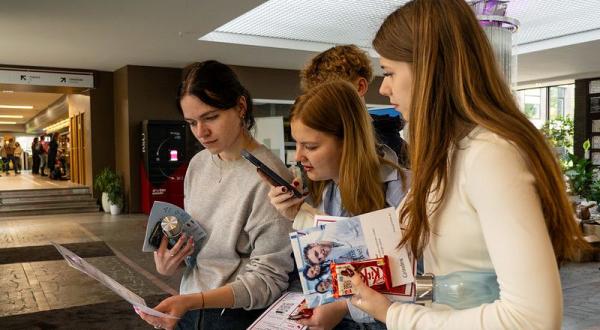What is a cardiac surgery internship like in Austria?
Would you like to assist in a heart operation? RSU Faculty of Medicine student Lauma Putniņa was asked this question on the morning of her second day of an internship at University Clinic for Cardiac Surgery, Tirol Kliniken, Austria. This means that already on the second day of her internship the student was invited to take part in a heart operation where the patient's valve is replaced during open-heart surgery. The student considers this as an unexpected surprise and a fantastic opportunity.
Thanks to the collaboration between the Latvian Medical Students' Association, Rīga Stradiņš University (RSU) and the Latvian Medical and Dental Association and an Ilmārs Lazovskis scholarship, Lauma had the opportunity to take on a month-long internship in Austria, a country that is one of the leaders in cardiac surgery and cardiology in Europe, and worldwide. The student continues that in our country there are few opportunities for internships because of the relatively small population. For this reason clinical internships are sought abroad, so that the knowledge and skills acquired there can later be applied in Latvia. In Austria, a student is permitted to take part in and observe heart and lung transplantations. For example at the clinic in Innsbruck every year on average 10 to 13 lung transplants are performed, whereas lung transplant surgery is not performed in Latvia.
Vice-Dean of the RSU Faculty of Medicine, Ingus Skadiņš explains that starting with the new study year, RSU Faculty of Medicine sixth year students from the Surgery, Internal Diseases and Paediatrics programmes will have clinically-based teaching, where, in comparison with the current system, there will be extensive opportunities to practice in situations that resemble those of a real hospital. Initially, clinically-based study groups were set up, by surveying students and finding out their interests, as it is important for RSU to implement new initiatives in a democratic and open way, by coordinating them with students, so that everyone is involved in the changes. Yet, according to Assistant Professor I. Skadiņš, all medical students will gradually gain a clinically-based education in their sixth year of studies.
L. Putniņa emphasises that in Austria, where the same as in Latvia, studies in faculties of medicine are for six years, the last year of studies is solely devoted to learning and practising in a clinic, as there are no more classical, academic lectures. Theoretical knowledge is gained individually, making use of video lectures, reading teaching materials, or sometimes lectures are organised on the clinical premises. During the internship the student takes on much more responsibility, as the leading doctors not only teach new specialists, but also expect student involvement. A local student must spend three months in an internship at an Austrian clinic, and for the remainder of this time they may practise in any other country, located nearby or even further afield. For example, one sixth year student completed his internship in orthopaedics in a clinic in Switzerland, and the anaesthesiology part of the cycle will be undertaken in Australia. This allows one to gain professional experience not only in a professional sense but also to learn about healthcare systems in other countries.
Students have the opportunity to participate in research groups in a specialty of their choice. In Innsbruck there are laboratories where research is conducted on mice, with specially-equipped operating theatres where students can learn and devote time to their research, using live pig tissue. The student continues, that at University Clinic for Cardiac Surgery, Tirol Kliniken you are given an opportunity to put your name on a contact list and if a heart transplant operation is about to be performed then you can expect a call from the doctor with an invitation to take part in the operation, even at night.
Lauma sees the regulations in Austria regarding organ transplants as very democratic. Because of the mountainous topography, skiers, mountain bike enthusiasts and other extreme sportsmen are prone to various accidents. The nation has an opt-out system where, in the event of a tragic, lethal accident, you don't need prior consent, are not required to sign documents, as the organs of the deceased are automatically available for donation. Austria is also a Eurotransplant member. Eurotransplant is responsible for organ donation in Austria, Belgium, Croatia, Germany, Hungary, Luxembourg, Netherlands and Slovenia. This international system of cooperation comprises all transplant hospitals, tissue laboratories and hospitals where organ donation is performed. For this reason many patients hoose clinics in Austria, for example, over Germany, where legislation regarding organ transplantation is much stricter.
A medical student in Austria can choose their specialty during the so-called basic year, where they have the opportunity to be an intern in three professions – three months in each – for example, cardiac surgery, cardiology and anaesthesiology. Following this internship it is much easier to choose a specialty.
While still in Year 11 at Madona State Gymnasium, Lauma already knew that her future specialty of choice is medicine. Her interest in cardiac surgery grew when she attended the RSU course: An insight into contemporary cardio-thoracic surgery, run by the Cardiac Surgery Centre at Pauls Stradiņš Clinical University Hospital, in conjunction with Johnson & Johnson and the RSU Student Union. In September Lauma will begin her sixth year of studies at the RSU Faculty of Medicine. In addition to her medical studies she trains in triathlon which she views as a very multifaceted sport. University Clinic for Cardiac Surgery was not only a positive period in her past, new contacts were established there and an internship is planned here in the future.




